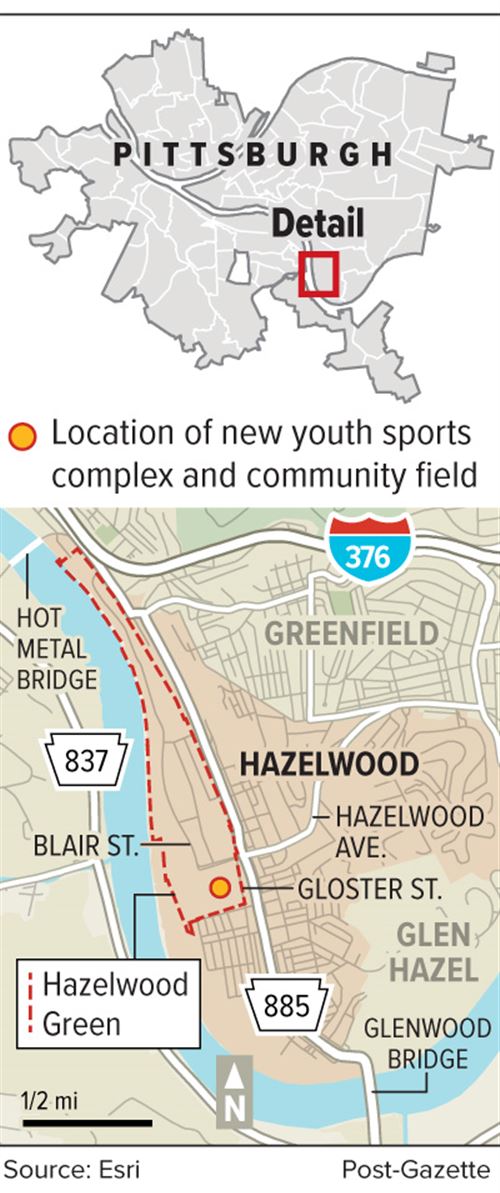Taking the field: Hazelwood Green youth sports complex ready to advance
By Mark Belko / Pittsburgh Post-Gazette
A $10 million youth sports complex to be built at an old Hazelwood coke works site is nearly ready for prime time.
Representatives for developer Tishman Speyer briefed the Pittsburgh Planning Commission Tuesday on proposed guidelines for the project, which is being undertaken in partnership with the Richard King Mellon Foundation and the Steelers football team.
Jonathan Kamin, Tishman Speyer attorney, said approval of the guidelines should clear the way for development of the sports complex and community field at Hazelwood Green, site of the former LTV coke works.
At full buildout, the state-of-the-art venue will be used for youth football, boys and girls flag football, football clinics involving current and former Steelers players and coaches, soccer games and clinics, and other activities.
It will also feature the renovation of a 10,000-square-foot building that is to be used for indoor sports and recreation, bleachers, concession stands, a scoreboard, ticket booths and locker rooms.
During Tuesday’s briefing, Mr. Kamin said guidelines for “spectator events developments” are needed because the original plans for Hazelwood Green, a brownfield, never contemplated such facilities.
The guidelines are part of several development updates Tishman Speyer is proposing at the sprawling 178-acre site on the Monongahela riverfront to fine tune the master plan for the site. Others include signage and the possible development of parking garages along some sections of Second Avenue.
“This is a massive project. It sat pretty much dormant for a while. Now that things are starting to happen on site, we’re learning. And I think we’re all learning together that some of the things that existed 10 years ago when it came in are either impractical or don’t work. We’re just trying to figure out ways to make things work so that there is clarity,” Mr. Kamin said.
Steelers Charities will operate the sports complex. It is being funded through a $10 million grant from the Richard King Mellon Foundation.
In part, the goal of the complex is to help address a “well-documented shortage of youth-centric sports and recreation destinations in the city of Pittsburgh,” according to last year’s announcement of its development.
Steelers officials have said they hope to use the new facility not only for clinics and games but also for community programming and player-led initiatives.
The proposed guidelines involve mostly technical aspects related to design, building heights and entrances.
Tishman Speyer is proposing that no more than 12 acres of land within Hazelwood Green be devoted to such facilities and that no one project can be more than 6 acres in size.
It also is suggesting that no building — including concession stands, locker rooms, and bleachers — can be more than 85 feet high. Accessory buildings, including observation towers, would be limited to a maximum of 60 feet.
Fencing can be as much as 10 feet high. Chain link is not permitted.
“We’re talking about high-quality design in terms of what we’re looking to do,” Mr. Kamin said, adding that the 10-foot height appears to be “the standard” among similar venues elsewhere.
In addition, field lighting will be designed to “minimize light pollution” by installing shielding on the luminaries.
No date has been announced for the start of construction. It is believed that the Steelers would like to have the complex up and running before the NFL draft comes to Pittsburgh in the spring of 2026.
Tishman Speyer, the Hazelwood Green master developer, has been involved in similar initiatives with the New York Yankees, the San Francisco 49ers and Harvard University.
Hazelwood Green is owned by the Almono partnership, made up of the Richard King Mellon Foundation, the Heinz Endowments, and Claude Worthington Benedum Foundation.
Over the past several years, the Richard King Mellon Foundation has invested more than $150 million into Hazelwood Green.
In addition to the youth sports complex, it supplied a $100 million grant for the University of Pittsburgh’s BioForge biomanufacturing facility and $45 million for Carnegie Mellon University’s Robotics Innovation Center.
Mark Belko: [email protected].
